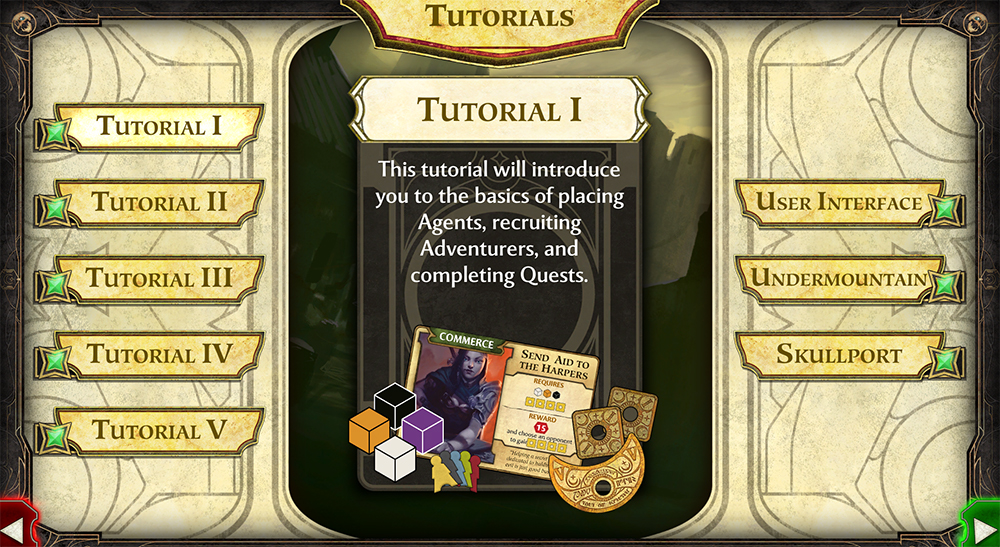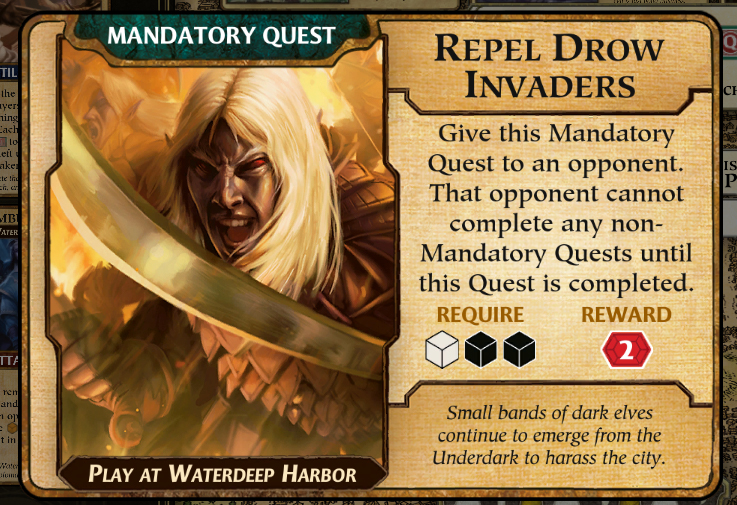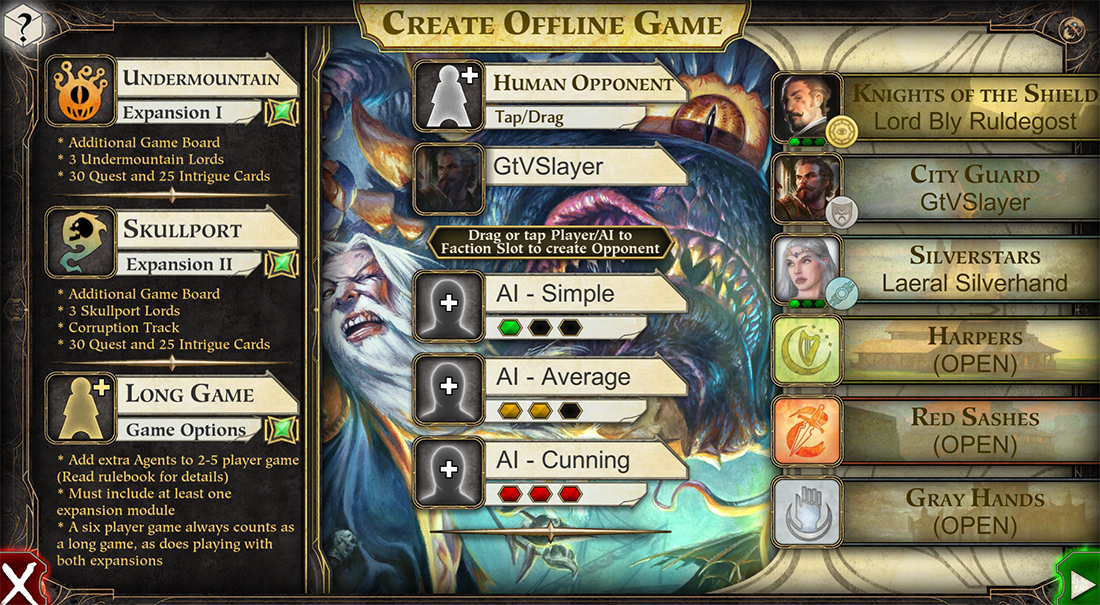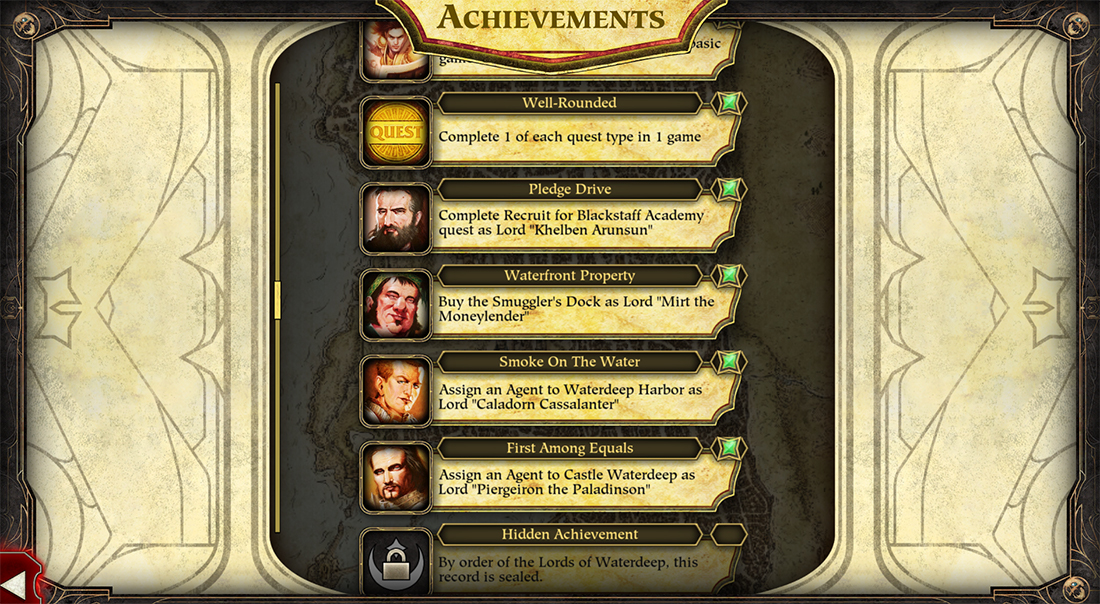D&D Lords of Waterdeep on Steam is a digital interpretation of a popular board game, which itself was derived from the world of Forgotten Realms inside the game Dungeons & Dragons. This digital board game has a very heavy emphasis on resource management and worker placement. While you are pooling your resources, players can disrupt each other in the slightest of ways. So, is this game tedious or enticing? We are going to dive head first into an indepth review of Lords of Waterdeep.
Not All Treasure Is Silver And Gold, Mate.
In Lords of Waterdeep, you assume the role of a masked ruler within the city of Waterdeep. You employ agents to do your bidding by going on quests, collecting things you need around town, or sabotaging your enemies. You get a cut of the profits when you expand the city by opening up a new building. To win D&D Lords of Waterdeep, you will establish influence over the city by the successful completion of quests, intriguing other lords (players), and acquiring assets for endgame scoring. Each masked lord has a hidden objective that can tip influence in their favor.
Getting started in D&D Lords of Waterdeep on Steam
Once you have the game installed, you should head over to the tutorials. The tutorials get you playing some sample rounds of the game. Without the tutorials, only knowledgeable players of the board game can jump right in without hiccups. The tutorial section seems involved at first, but it breaks down everything for you nicely.

In the beginning of the game, you will be given your hidden role, a couple of quests, a few Intrigue cards, and some gold coins to get you going. Taking note of your hidden role. Understanding how to maximize the scoring for it will influence your decisions throughout the game. Your resources in this game are adventurers like fighters, wizards, clerics, and rogues. Agents are your actual workers. Adventurer resources are worth one point a piece–and turning them in to complete quests only nets you a few points in most cases–so figuring in the bonuses from your hidden role will guide you to maximize your points.
D&D Lords of Waterdeep on Steam Review | Basics
You will be given a specific amount of agents to place in each of the eight rounds of the game. In a normal game, you receive three agents per round. You get an additional agent in round five. Typical action spaces allow you to collect resources, play Intrigue cards, build a new space players can use, draw quests to work on, and swap goods for other goods. Each action requires a agent to be placed on it to utilize the space. For example, if you want to go on a space that provides you a purple resource, you can always go on it with one of your agents. If the space says you must pay a resource to activate its ability–and you do not have it–you cannot go on that space just to block your opponents from using it.
Gameplay goes in a set player order. There is an action space that, when claimed, changes the starting player. Each player’s turn goes in this order: 1) place an agent in an action space; 2) take the action of that space; and then 3) complete up to one quest the player has the resources for. A lot of the cards you can obtain, and actions you may take, will keep it interesting by bending the general rules. Completing certain quests may augment points you receive for doing other actions in the game, or provide you benefits for utilizing specific named spaces.

Waterdeep Harbor is a special space that requires having an Intrigue card to play from your hand when you occupy it. At the end of the round, after all agents have been placed, the agents that occupy Waterdeep Harbor can be placed on empty spaces that no players have claimed. They then take those spaces’ actions.
After all agents have been placed, each player picks up all their agents and just start playing the next round. After the eighth round, points are tallied. The following numbers are added together: 1) the points received from completing quests, activated abilities, and playing intrigue cards, 2) the total number of adventurers you have in your inventory, 3) the rounded down total of half the number of coins you have, 4) minus any corruption you have received, and 5) the bonuses from your hidden role in the game.
D&D Lords of Waterdeep on Steam Review | The Good
The inherent difficulty of playing a worker placement game is not knowing the tempo at which you should be doing certain actions the first few times you play the game. The worst is starting a game and then feeling like you are losing the entire time. Experience matters. This issue is big when you introduce the physical game to someone. It does not really matter here. If you are new to Lords of Waterdeep, and not just this digital version of it, you should definitely play your first few games against the computer. You will learn the interface, figure out how to gauge the flow of the game, and suffer those first few fails from not understanding the interface.

With that said, D&D Lords of Waterdeep on Steam is a delight to play. There are a lot of subtleties put into the design of the interface that make clicking around the menus intuitive. The game looks great even though the background music does get old. You can start your turn over if you change your mind, as long as new cards have not been revealed. This game has a lot of scoring elements that need to be tracked, which makes me believe this is the preferred way I would like to play Lords of Waterdeep. The different quests, Intrigue cards, and action spaces you can acquire will make the game a little different each time you play. The achievement system seems arbitrary at times, but it is fun.
D&D Lords of Waterdeep on Steam Review | The Bad
If you like the real life board game version of Lords of Waterdeep, then I truly believe you will love this game. All the issues with it, are issues that the existing board game has.
As discussed in the previous section, the learning curve for a new player makes it difficult to jump right in and have a good first, or even second, game with friends. This is easily avoided by asking your friends to try the game a few times before you play it with them. Or everyone can just learn it together. Obviously, players that know resource management games may just be able to min-max their turns right from the beginning.

The arbitrary starting quests that you pull at the beginning of the game, as well as the Intrigue quests you start with, might not work with your hidden role. On the flip side, you might start with two quests that give you bonus points. Throughout the game, you may never get a chance to even draw a 40 point quest to even attempt to complete it. Also, some of the hidden roles in the expansions are just not as good. Getting better at playing will reduce your odds of getting blown out, but bad luck can definitely strain your game.
Other players’ turns can be hard to keep track of. However, you can always click around to see everyone’s stats to make the best decisions on your turn.
D&D Lords of Waterdeep on Steam Review | Verdict
D&D Lords of Waterdeep is a great rendition of a fan favorite board game. It is easy to get into, and the randomness of the card draws can act as a buffer to give some players a chance against seasoned veterans. We definitely recommend giving it a try.
3.5/5